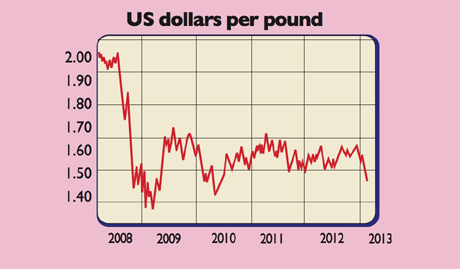
British data produced a nasty surprise this week. Manufacturing output fell by 1.5% in the month of January. Total industrial production, which includes mining and utilities as well as manufacturing, slid by 1.2%. Production is now at its lowest level since 1992.
Expectations of yet another downturn and more money printing by the Bank of England spread, sending the pound to a near-three-year low against the dollar. Bond prices showed that investors’ inflation expectations had risen to their highest level since September 2008. Markets now expect inflation of 3.3% over the next few years.
What the commentators said
George Osborne’s “march of the makers is stuck in the mud, or, perhaps, the snow”, said Andrew Clark in The Times. “Only a supersonic spurt of productivity” from the services sector, worth 77% of GDP, can now save us from a third recession in five years – the “triple-dip”.
In the past 170 years, Britain has been through two world wars, the 1930s Depression and the 1857 global slump, noted The Economist. Five years after each of these events, the economy was growing. This time output is not expected to recover its pre-crisis high until 2015. “With an ill wind the country could easily lose a decade.” Poor wage growth and inflation are undermining consumption and “pessimism is calcifying”.
A key problem, as Sam Fleming in The Times pointed out, is that unlike in America, the banks aren’t fixed yet, and won’t step up lending significantly until they have more capital to cover potential losses.
With stagflation threatening to make a comeback, everyone is hoping next week’s Budget can give growth a kick. But next Wednesday’s statement is unlikely to bring either “a Keynesian epiphany or a supply-side revolution”, said Janan Ganesh in the FT.
The government sees the loss of its triple-A credit rating as an incentive to stick to the course to avoid another downgrade. And Osborne appears unpersuaded by the case for radical tax cuts. “Perhaps the most we can expect,” said Capital Economics, “is a boost to capital spending”, funded by cuts elsewhere.
Pity, said The Daily Telegraph. The markets are “looking for growth now”, and the tanking pound and rising price of credit default swaps – insurance against default – on public debt suggest that they are “slowly giving up on the government”. That will “make life even more difficult”.